Raphael Bundage total funding: $6.27 million
by Skip Anderson and Drew Ruble
For Raphael Bundage, an MTSU professor in the School of Music, director of choral activities, and longtime director of the Tennessee Governor’s School for the Arts, music began as a family affair.
Bundage’s father, a Methodist (AME) minister (who also taught chemistry at Jarvis Christian College), sang bass in a high school quartet. His mother, an English teacher, was a wonderful singer herself. One of his sisters sang opera. Another played violin. His brother played trumpet. Even his paternal grandmother played guitar.
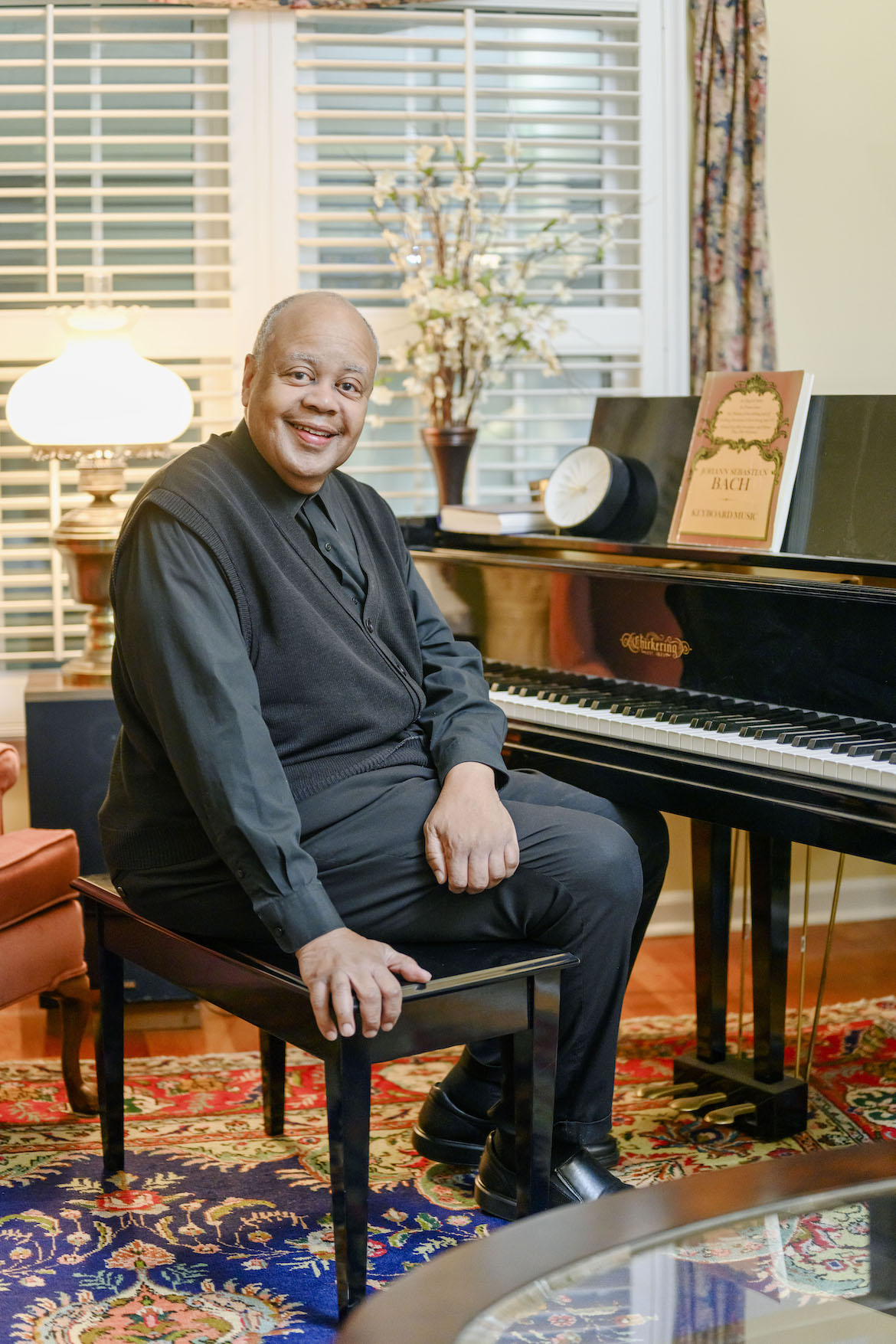
MTSU photo by J. Intintoli
“When I was very young, we stayed in the manse of the church,” said Bundage, a native Texan. “At family gatherings, especially around the holidays, well, those days were filled with carols around the home and at the church.
“When I was old enough to play some carols on piano, we would sing together. We still do that. We still do that and sing as a family.”
Music, as the expression goes, was in his blood. His direction in life was clear. One visceral memory Bundage has of the family piano perhaps best exemplifies this passion.
“As a kid, I would gnaw at the keyboard,” Bundage said. “There were teeth marks on the piano. I so wanted to be close to the music.”
CLIMBING THE LADDER
Bundage sang in school choirs from elementary school through high school. His earliest taste of conducting came in high school when he got to conduct a vocal ensemble of 14 high school singers called the Songmates.
A musician as well, Bundage played in the high school band and had an extracurricular band called the Dynamics—a group on the order of Herb Alpert and the Tijuana Brass. The Dynamics would play for dances at the National Guard armories in the Dallas-Fort Worth area, among other venues.
AS A KID, I WOULD GNAW AT THEKEYBOARD. . . . I SO WANTED TO BE CLOSE TO THE MUSIC.
Years later, as a college student in the 1970s, Bundage would famously perform in another band—the pep band for the National Football League’s Dallas Cowboys. Bundage played both clarinet and tenor saxophone at all the home games for several years. He loved the music but wasn’t much of a football fan, admitting he brought a book to the games to read between songs.
After graduating with honors from high school in Fort Worth, Bundage was accepted to Texas Christian University’s School of Music.
“They were known for several things,” Bundage said. “Theory, music history, and the International Van Cliburn Piano Competition every four years.”
“On weekends, I played at the Italian Inn in Fort Worth, where I accompanied waiters who sang Italian art songs and Broadway hits,” Bundage said, referencing the 1950s eatery that proudly advertised “no hamburgers, no bar-b-q” in Cowtown, U.S.A. “We played pianos. Got tips.”
Years later, as a college student in the 1970s, Bundage would famously perform in another band—the pep band for the National Football League’s Dallas Cowboys. Bundage played both clarinet and tenor saxophone at all the home games for several years. He loved the music but wasn’t much of a football fan, admitting he brought a book to the games to read between songs.
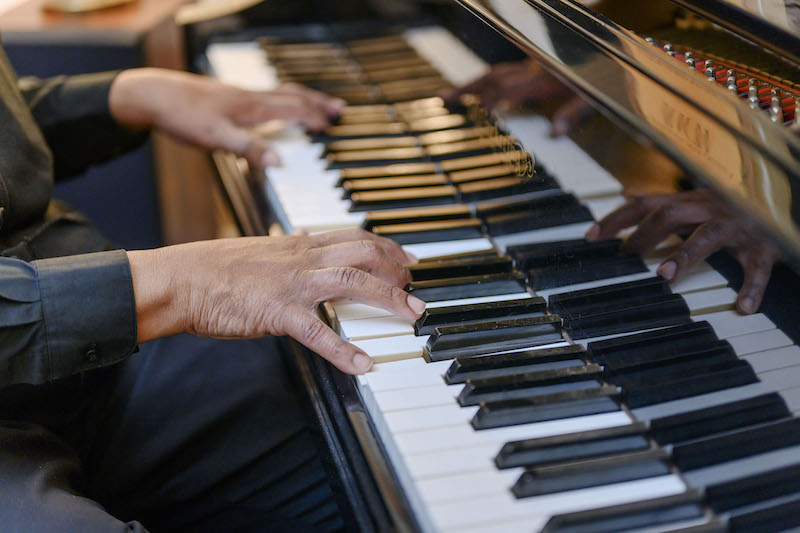
After graduating with honors from high school in Fort Worth, Bundage was accepted to Texas Christian University’s School of Music.
“They were known for several things,” Bundage said. “Theory, music history, and the International Van Cliburn Piano Competition every four years.”
All of these formative years in Bundage’s life encompassed the time of Elvis, the British Invasion, and psychedelic rock. But pop music didn’t interest Bundage much. It was choral music that attracted his interest. In addition to the wonderful piano faculty, TCU also had fabulous choral music.
“I got to conduct those choral ensembles,” he said. “In those days, they had weekly chapel services, and undergraduates could conduct the choirs. I also got to conduct the prestigious TCU A Cappella choir.”
Bundage followed that up as director of the Eastman Chamber Chorus and assistant director of the Eastman-Rochester Symphony Chorus while earning his master’s and doctorate at the Eastman Conservatory of Music in New York.
PUTTING IT INTO PRACTICE
Bundage’s professional career began as a supervisor of choral music in the Texas public school system.
“Some of the best choral music in Texas was along the Rio Grande Valley,” Bundage said. “I taught junior high and high school in the border town of Edinburg from 1976 to 1982. . . . It was some of the best choral singing I’ve ever heard.”
A few years later, in 1985, he came to MTSU as a professor in the School of Music. How did he find MTSU from deep in the heart of Texas? Well, it started with a job tip from a teacher Bundage knew at MTSU. It ended with the strong recommendation of his mentor to take the position he was offered, for various strategic reasons.
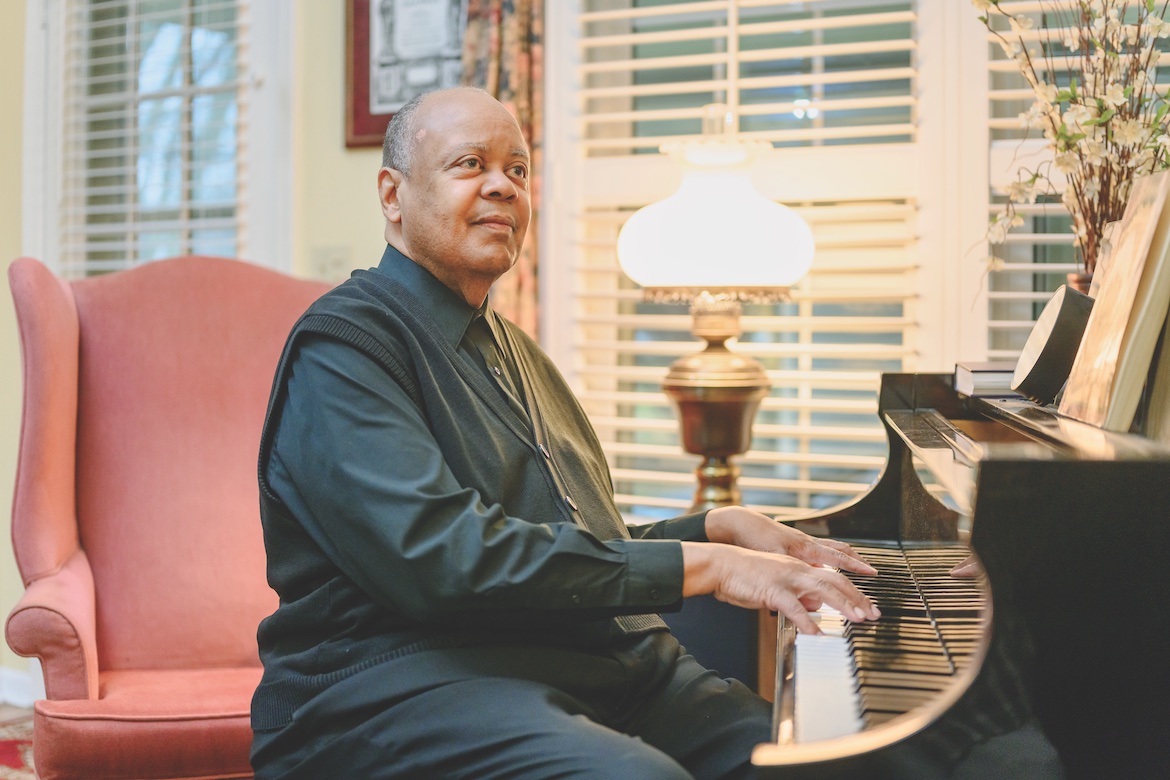
American musicologist Alfred Mann, who specialized in the history of Western musical theory and was a professor at Eastman, convinced Bundage that MTSU would make for a wonderful start to his college teaching career.
Mann also liked Murfreesboro’s proximity to Atlanta, where his colleague Robert Shaw—an American conductor most famous for his work with his namesake Chorale, with the Cleveland Orchestra and Chorus, and with the Atlanta Symphony Orchestra and Chorus—was located. Shaw also was renowned for his support for racial integration in his choruses and his support for modern music.
“Once in Murfreesboro, I would travel to Atlanta and sing in Shaw’s Atlanta Symphony Chorus, and I would stay over and have private lessons in his home. This was essentially a post-doc position.”
Back home in Murfreesboro, Bundage turned his MTSU position and rising profile into formidable positions like chorus master of the Nashville Opera Association and Nashville Symphony Chorus, conducting choruses for several seasons under the late maestro Kenneth Schermerhorn, who led the Grammy-winning Nashville Symphony for 22 years.
Today, Bundage is a frequent clinician and adjudicator in the choral field.
PASSING IT ALONG
Such a storied background in choral music makes Bundage a great professor. But it also made him the perfect fit to direct one of MTSU’s most prestigious—and lucrative—grant programs.
For more than a decade, from 2010 to 2021, Bundage served as the primary investigator (PI) on the nearly half-million-dollar annual Tennessee Governor’s School for the Arts (GSFTA) grant—and served as the program’s director.
For the past 38 years, the GSFTA, hosted by MTSU’s College of Liberal Arts, has been a tool for the education, training, and development of gifted high school students in Tennessee. The pre-professional summer curriculum includes individual and group instruction designed to help each rising 11th- and 12th-grade student explore and develop talents in music, ballet, theater, film-making, or visual arts over three weeks.
Students apply or are nominated by their teachers and competitively audition or present portfolios of their work. When they’re accepted, they come to MTSU for days filled with workshops and presentations and master classes and rehearsals and guest lectures and field trips and concerts—and evenings that are much of the same.
As host for the Governor’s School for the Arts, MTSU awards scholarships with Tennessee Department of Education grants to help students with program fees, allowing them to take advantage of this unforgettable on-campus experience.
SUCH A STORIED BACKGROUND IN CHORAL MUSIC . . . MADE HIM THE PERFECT FIT TO DIRECT ONE OF MTSU’S MOST PRESTIGIOUS—AND LUCRATIVE—GRANT PROGRAMS.
MTSU is the oldest of the Governor’s Schools, serving as the pilot when the state established summer programs for young people in arts, engineering, and international studies—one for each of Tennessee’s three grand divisions. Boasting nearly 10,000 alumni, the arts program is also the largest of the 11 different Governor’s Schools now sponsored annually across the state, ranging from agricultural sciences to teaching.
In the summer of 1985, the same year Bundage arrived on campus, MTSU hosted the first Governor’s School for the Arts with 90 orchestral students. The following year, the program was expanded to include wind ensemble, vocal music, theater, and visual arts. Dance was added in 1987, and filmmaking in 2009.
Since 1985, more than 7,000 of Tennessee’s gifted and talented students have been afforded the opportunity to attend the Governor’s School for the Arts. Each January, more than 1,400 compete for 230 available scholarships.
Bundage became director in 2010 and taught in the GSFTA until summer 2021, handing over the reins to MTSU colleague Kate Goodwin (Theatre).
CROWNING ACHIEVEMENTS
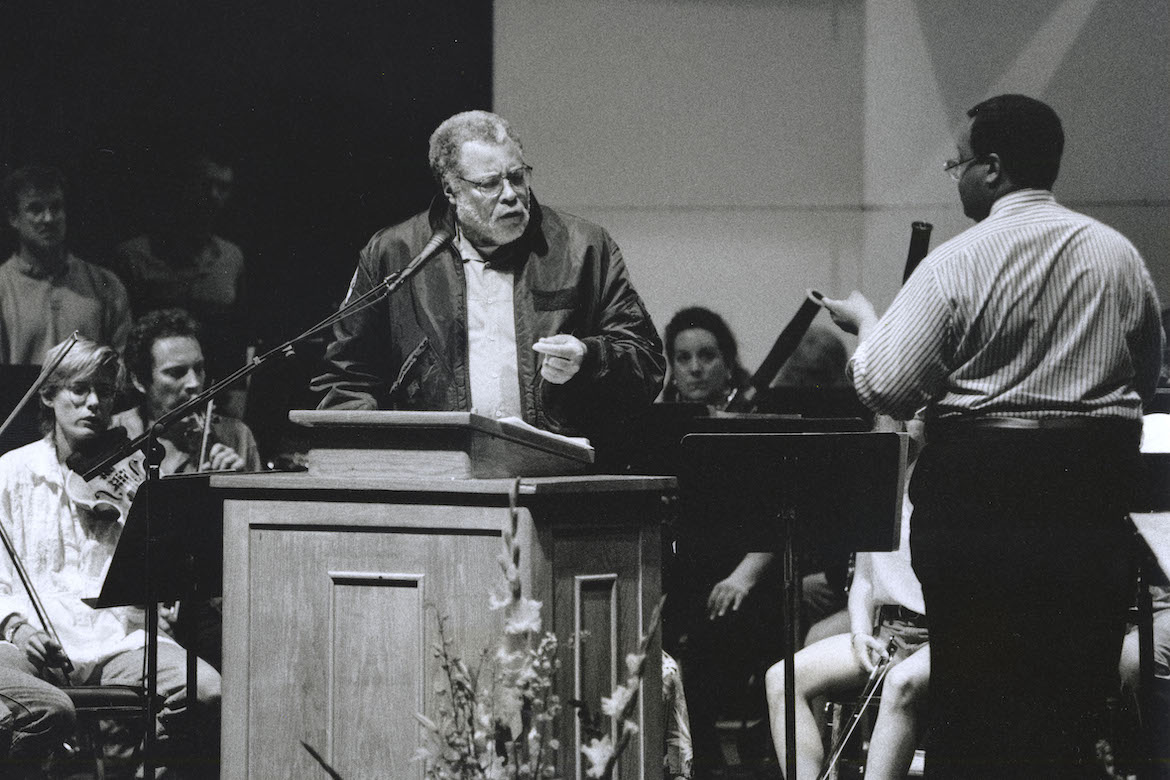
James Earl Jones at MTSU in 1994, with Bundage (r) conducting
In addition to his steady stewardship of GSFTA, Bundage’s accomplishments with the choral department at MTSU are equally impressive. He even brought esteemed actor James Earl Jones to MTSU’s Tucker Theatre in fall 1994, shortly after Jones’ voice work as Mufasa in The Lion King movie, to narrate Aaron Copland’s “Lincoln Portrait” as Bundage conducted choral students.
Bundage’s various MTSU choral ensembles have toured extensively throughout the U.S. and Europe.
On Palm Sunday in 1989, his ensemble performed at the morning service in composer Wolfgang Amadeus Mozart’s home church, the Cathedral of Salzburg, in Austria.
“The service itself called for several anthems,” Bundage said, “both as prelude music and espe-cially during the Communion part of the service.”
Most recently, the MTSU Schola Cantorum was honored to sing at the Vatican, providing several selections for the Vesper service.
During Bundage’s tenure, an MTSU ensemble also performed in Carnegie Hall as he conducted Mozart’s Mass in F-major.
In 2011, MTSU choral students sang at St. Peter’s Basilica during a Saturday evening Mass.
It’s a long way from Rome, Italy, to a preacher’s dwelling outside Fort Worth, Texas, where Bundage chewed piano keys. His lifelong love of choral music got him there.
NOT TO TOOT OUR OWN HORN . . . BUT THERE IS A LOT OF FABULOUS MUSIC BEING MADE HERE, AND WITH OUR EXCELLENT MUSICAL STAFF HERE, BOTH INSTRUMENTAL AND VOCAL, WELL, WE’RE VERY FORTUNATE INDEED.
For all his personal accolades, Bundage said the best part of being a professor is being around talented and driven students. According to Bundage, there has been a steady stream of elite vocal talent streaming in to the University.
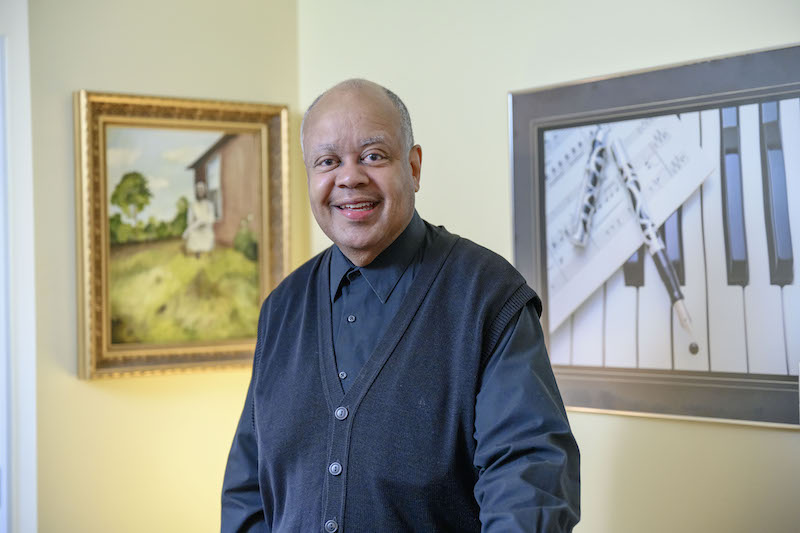
“It’s remarkably consistent, actually,” he said.
“MTSU is fortunate to attract very talented vocalists and has done so routinely over the past 38-plus years. It’s a wonderful representation of our department.”
The MTSU School of Music has a strong reputation throughout the region for music instruction and the quality of students, who get to compete not just regionally but also nationally.
“Our alumni have gone on to the international stage of opera. They’ve won national trumpet competitions,” Bundage said. “Not to toot our own horn . . . but there is a lot of fabulous music being made here, and with our excellent musi-cal staff here, both instrumental and vocal, well, we’re very fortunate indeed.”
Much of that attraction can be attributed to the Governor’s School, he said.
“These young students experience our campus and teachers,” he said. “So there’s a natural recruitment mechanism there, too.”
THE SOUND OF SILENCE
For Bundage, it’s been a busy and fulfilling career at MTSU. He has a lot to show for the effort he has put into his job.
Others who work as long and hard as Bundage might get to the end of another rigorous day at work and turn to classical music to relax.
Bundage, whose work is classical music, seeks an alternate route to inner peace.
Asked what type of music he likes to listen to on his own time or when he needs to unwind, Bundage offers that he actually likes a little break from music.
“Mostly, it’s wonderful to have a little silence,” Bundage said.

COMMENTS ARE OFF THIS POST